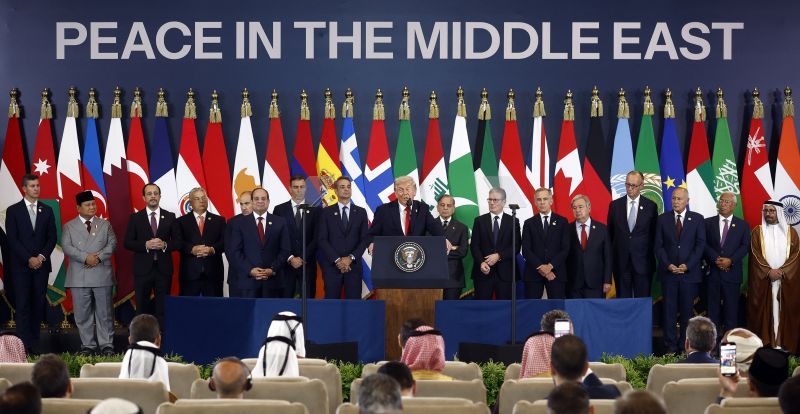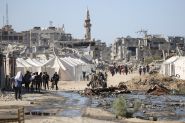- Home
- Middle East
- The Tricky Creation of an International Stabilization Force in Gaza

©Yoan Valat / Pool / AFP
Two years after the outbreak of the Gaza conflict, the United States is seeking to establish a new framework for stability in the enclave.
On Monday, Washington submitted a draft resolution to the UN Security Council to create an international stabilization force tasked with ensuring security and transitional governance in the Palestinian territory until the end of 2027.
The idea of such a force, however, dates back several months. As noted by the French Institute for International and Strategic Relations (IRIS), it builds on meetings held in Abu Dhabi as early as 2023, attended by Tony Blair (former British Prime Minister), Jared Kushner (former adviser to Donald Trump), Ron Dermer (Israeli Minister for Strategic Affairs), and Mohamed Dahlan (former senior Fatah official). These gatherings, organized under the auspices of Abu Dhabi, were already aimed at considering a post-conflict governance scenario in Gaza and potential regional security cooperation.
The discussions considered various scenarios and regional cooperation under U.S. guidance. The twenty-point plan presented by Donald Trump in September includes several of these principles, including the establishment of a multinational security mission.
A Multinational Force with Ambitious Goals
The text submitted to the Security Council outlines a temporary force, supported by several partner countries, tasked with securing Gaza, overseeing the disarmament of armed groups, and protecting civilians. The mission would also assist in training a new Palestinian police force, in coordination with neighboring countries, to prepare for the gradual return of the Palestinian Authority.
This transition would be guided by a Gaza Peace Council, chaired by Donald Trump, and backed by a committee of Palestinian technocrats in charge of civil affairs. The setup aims to prevent an administrative vacuum while laying the foundation for a reformed Palestinian administration.
According to the Washington Institute, the swift deployment of this force is essential to prevent armed groups from exploiting the security vacuum. The think tank emphasizes the need for a clear mandate and close coordination between the international mission, Palestinian forces, and Israeli authorities.
Debate Over UN Mandate
The mission’s mandate remains a point of contention among diplomats. Jordan, Germany, and Indonesia are pushing for the force to operate under an explicit UN Security Council mandate, ensuring its legitimacy under international law.
The Washington Institute argues that a resolution based on Chapter VI of the UN Charter, focused on cooperation, would be preferable to a Chapter VII resolution, which would authorize the use of force. A diplomatic approach, the institute says, would avoid adding a coercive dimension to an already delicate situation.
Washington, nevertheless, wants the mission to have enough flexibility to enforce stability and ensure the plan’s implementation.
Israel, meanwhile, supports the concept of an international force but insists that its mandate align with the country’s security requirements. Israeli authorities have stated that they do not oppose an Arab or Muslim presence, provided it excludes certain countries considered hostile, such as Turkey.
Disarmament and Stability: The Challenges Ahead
A key priority of the plan remains the full demilitarization of the Gaza Strip, a necessary condition for any complete Israeli withdrawal. The Washington Institute warns that the international force must avoid repeating the shortcomings of UNIFIL in Lebanon, which failed to prevent Hezbollah’s rearmament.
The mission must therefore combine law enforcement, anti-smuggling operations, and the protection of humanitarian corridors, while supporting the development of a Palestinian police force capable of eventually assuming these responsibilities.
Several countries—including Indonesia, Azerbaijan, Pakistan, and Egypt—have expressed interest in contributing, though no firm commitments have been made yet. A military-civilian coordination center has already been established in Kiryat Gat, southern Israel, under U.S. leadership, with the participation of British and French troops.
The final composition, funding, and precise duration of the mandate remain undecided, with Security Council discussions expected to continue in the upcoming weeks.
The planned international force in Gaza is intended as a transitional tool to restore security and support reconstruction. Its effectiveness will ultimately depend on balancing international legitimacy, regional coordination, and local acceptance.
In a region still marked by deep-seated distrust, the mission’s success will hinge on its ability to protect civilians while laying the foundation for lasting Palestinian governance.
Read more




Comments